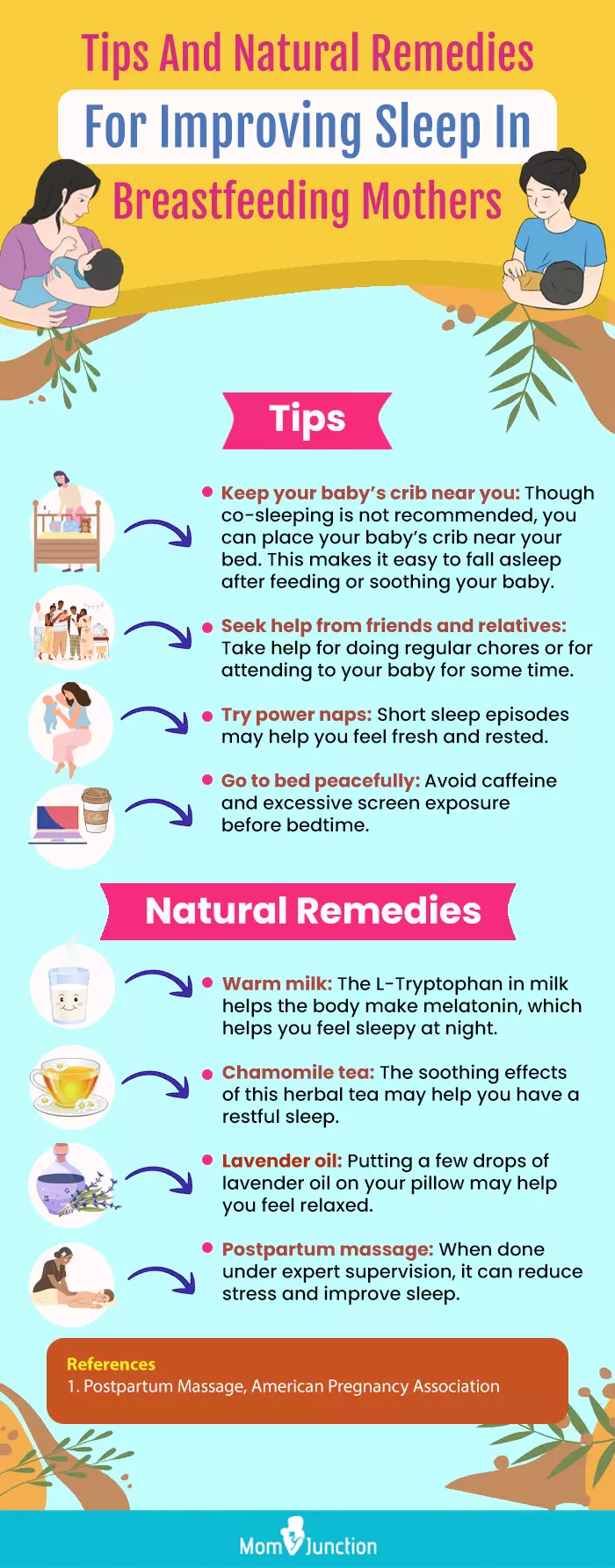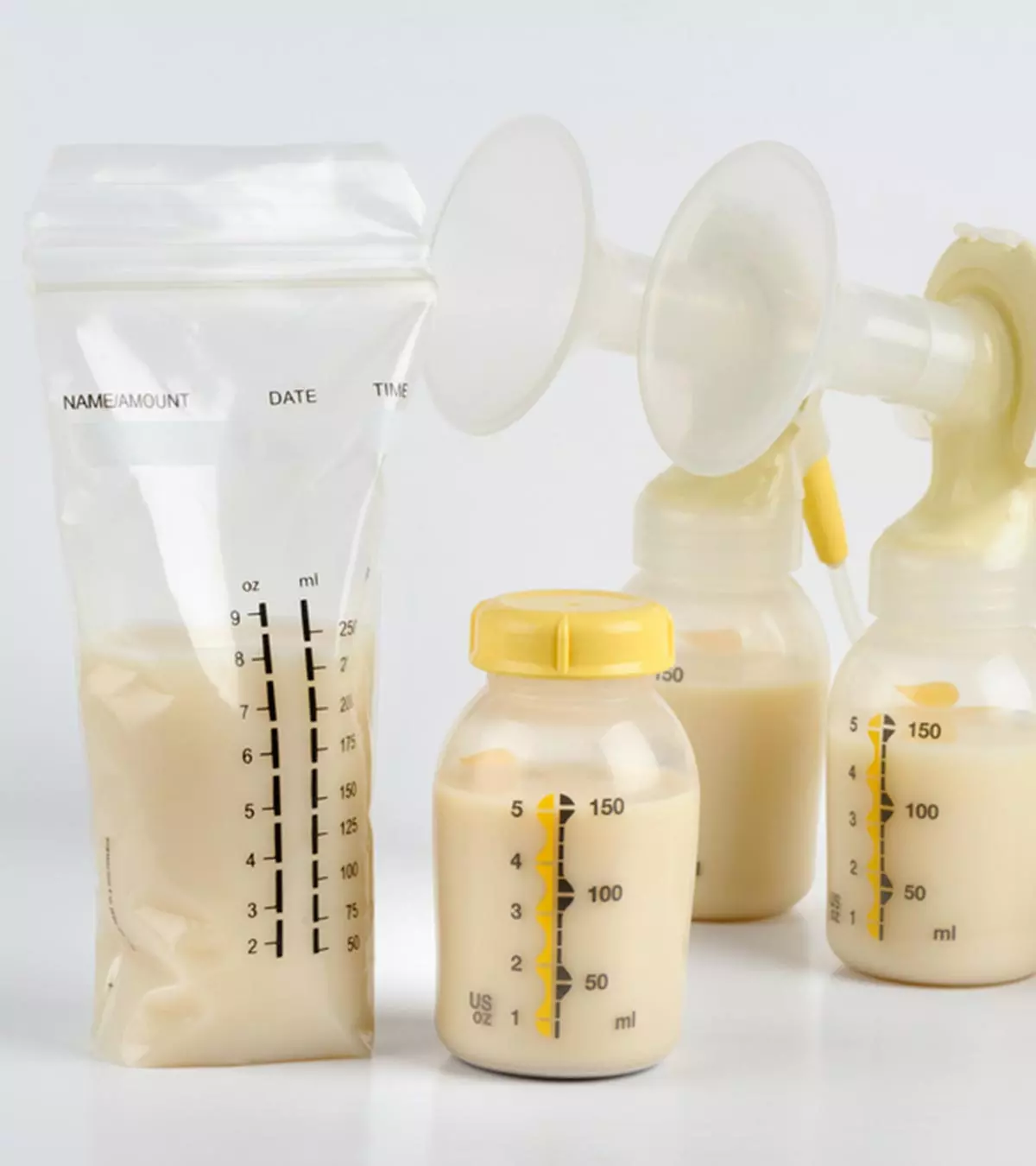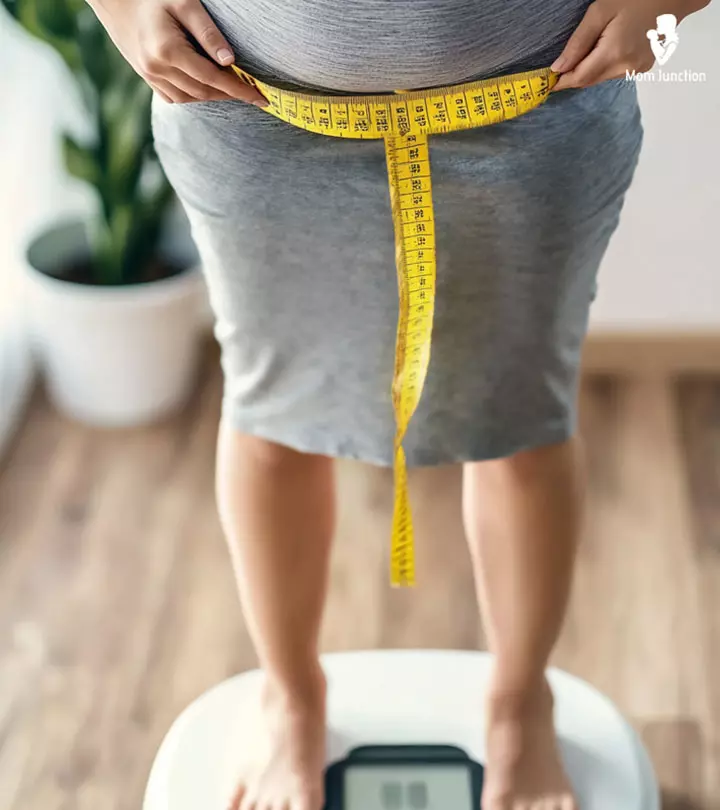
Image: ShutterStock
New moms often struggle with sleep deprivation because of hormonal changes and changes in lifestyle and daily routine, which involves the constant care of a newborn and the stress of adjusting to parenthood. It has been reported that postpartum anxiety and depression occur in women with chronic sleep loss as adverse pregnancy outcomes (1). In such a situation, many women may want to know if it is safe to take sleeping pills when breastfeeding. Most doctors do not advise taking sleeping pills during motherhood because they may leak into the breast milk and cause adverse effects on the baby. However, if you have considerable trouble sleeping, you may seek the guidance of your healthcare provider, whose prescription may contain drugs that have a low ability to pass into the milk. You may also try some effective home remedies to enhance sleep and relax. Read the post to know about the safety of sleeping pills when breastfeeding and the natural remedies that should be taken care of to sleep better.

Key Pointers
- Sleeping pills are generally not safe and not prescribed for lactating mothers as they can pass through breast milk to the baby.
- Doctors may prescribe zolpidem to lactating mothers who are struggling with sleep disorders.
- Drinking warm milk, sleeping next to your baby, and taking power naps may help a lactating mother sleep.
- Sprinkling lavender oil on the pillow and drinking chamomile tea can help relax and induce sleep.
Can You Take Sleeping Pills When Breastfeeding?

There are certain drugs that are safe to take while you are breastfeeding, while there are drugs that your doctor will caution you about. Mindy Cockeram, childbirth and breastfeeding educator from California, says, “Sleep deprivation is tough with a young child, but sleeping pills aren’t the answer. A drowsy mother may struggle to care for her baby or wake for feedings, and breastmilk could be affected too.”
Conventional and otherwise unassuming drugs are not as safe as you think while you are pregnant, let alone while breastfeeding. These can mix in your bloodstream and reach the milk that will finally reach your newborn. Taking these drugs can also sometimes affect your milk supply and interfere with your baby’s breastfeeding routine. Any drug you take should be checked with your baby’s doctor (2).
What Sleeping Pills Are Safe To Take While Breastfeeding?

According to most doctors, no sleeping pills are safe to take while you are breastfeeding as they might have side effects. Consultant obstetrician and gynecologist Dr. Shashwat Jani suggests, “Taking sleeping pills while breastfeeding can pose risks to both mother and baby. Most sleeping pills pass into breast milk, potentially causing drowsiness or sedation in babies, altering their sleep patterns or feeding habits, and interacting with other medications.”In some cases, sedatives such as zolpidem may be prescribed when you are breastfeeding. This drug mixes in the breast milk at a low level. However, extremely young or preterm babies may experience symptoms such as respiratory depressioniwhen your breathing is too slow or too shallow and low muscle tone (3).
Even with a healthy baby, if you’re taking any sleeping pills, monitor your baby for any adverse reaction. If you notice any changes in your baby’s feeding and sleeping pattern or your baby seems lethargic or any other symptoms, consult a pediatrician immediately. Any drugs you take to help you sleep while breastfeeding should first be checked with your doctor.
 Quick fact
Quick fact6 Natural Remedies To Help You Sleep While Breastfeeding

Taking sleeping pills while you are breastfeeding is not recommended. Thus, you may consider natural ways to fall asleep while breastfeeding. Try out these tips and tricks that may work in your favor:
1. Sleep with your baby near your bed
In the initial maternal phase, you may need to wake up many times in the middle of the night to feed your baby. Sleeping near your baby can help you relax while you are feeding your baby in the middle of the night. This will help you go back to sleep right after your baby has finished feeding (4).
2. Try and get power naps
Every time that your baby falls asleep, you too try and catch those winks. You may not get long hours of sleep yet as you will be feeding your baby multiple times. Research published in the journal ‘Sleep,’ highlights that maternal sleep often remains highly disrupted for up to five months after childbirth, with many mothers getting less than the recommended 7–9 hours of sleep per night. Although specific studies on power naps for postpartum mothers are limited, taking short naps during the day can help reduce the effects of sleep deprivation (5). Having shorter nap breaks throughout the day can help you prevent feeling too sleepy or tired at night (4).
3. Drink warm milk just before sleeping
Milk contains a good amount of protein and is a good drink for you, especially when you are breastfeeding. It contains L-tryptophan, which is an amino acid. This will raise the level of melatoniniAn antioxidant hormone produced by a gland in the center of the brain that helps improve the body’s sleep cycle in your brain and make you feel sleepy (6). A study in the journal ‘Advances in Nutrition,’ indicates that dairy products, which are high in tryptophan, could help enhance sleep quality (7).
4. Chamomile tea
The herb chamomile is generally considered safe to take while you are breastfeeding. You can have it at bedtime. The calming effects of this herb can soothe and relax your senses and muscles. It will also help reduce or prevent flatulence and cramps (8). A study involving 80 postpartum women in Taiwan with poor sleep quality, published in the Journal of Advanced Nursing, examined the impact of chamomile tea on sleep. The findings showed improved sleep quality and reduced depressive symptoms (9).
5. Lavender on your pillow
Sprinkle a few drops of lavender oil on your pillow before you go to sleep. Alternatively, you can add a few drops of this oil on a handkerchief and place it on your pillow. You can also try using roll-on tubes that contain lavender oil. Apply this directly on your temples and forehead or behind your ears to feel calm and relaxed (10). A review of randomized controlled trials published in Holistic Nursing Practice found that lavender essential oil improved sleep quality in adults without diagnosed sleep disorders (11).
6. Bedtime routine
Although a proper bedtime routine might not be possible with an infant, try to follow a calming bedtime routine suitable for you and your baby. Activities like reading, gentle stretching, or listening to calming music can help your body relax and let you sleep. The University of Rochester Medical Center suggests that a bedtime routine lasting up to 30 minutes, with activities like bathing, feeding, and reading, can support the development of healthy sleep habits (12).
 Quick tip
Quick tipFrequently Asked Questions
1. Is it safe to take melatonin while breastfeeding?
Short-term use of melatonin when breastfeeding may not cause any adverse effects on the baby. However, it should only be consumed under a doctor’s advice (13).
2. Can I take Unisom sleep tabs while breastfeeding?
Occasional doses of doxylamine (the main ingredient in Unisom) may not cause adverse effects in the breastfed baby. However, consuming the medicine in large doses or for longer durations may cause drowsiness and reduce the milk supply (14).
3. When is melatonin highest in breast milk?
The melatonin concentration in breast milk at night is 23 ng/L. Melatonin is absent in breast milk during the daytime, with levels below ten ng/L (13).
4. Does breast milk pumped at night have melatonin?
Melatonin, produced and secreted in breast milk, is affected by the body’s internal clock and is at its highest levels at night when the body is resting and asleep (13). It follows that breast milk pumped during the night will contain appreciable amounts of melatonin.
If you suffer from sleeplessness after pregnancy due to the added work, stress, and responsibilities, do not resort to sleeping pills while breastfeeding. Breastfeeding itself is believed to induce a calming effect by releasing oxytociniA natural hormone that manages male and female reproductive systems, sexual arousal, childbirth, lactation, and human behavior , thus reducing cortisoliA steroidal stress hormone that helps regulate the body's response to stress levels and better sleep (15). So instead of immediately taking medicines, try out natural approaches and other home remedies such as chamomile tea, warm milk, or sleeping with your infant. If you are still not able to get enough good sleep, consult your doctor. They may recommend some effective techniques or medicines that do not pose a threat to you or your baby’s health.
Infographic: Home Remedies To Help Lactating Mothers Sleep Better
Using over-the-counter sleep medications is not recommended when breastfeeding. Even when prescribed, sleeping pills should be used judiciously. However, you may try some natural ways to help you have adequate sleep. The infographic also shares some effective tips on the same. Check out! Illustration: Momjunction Design Team
Sleeping pills though helpful also have several side effects. Take a look at the following video to learn more about the safety of sleeping pills.
Illustration: Is It Safe To Take Sleeping Pills While Breastfeeding?

Image: Dalle E/MomJunction Design Team
References
- Sleep Pharmacotherapy for Common Sleep Disorders in Pregnancy and Lactation.
https://www.ncbi.nlm.nih.gov/pmc/articles/PMC6965691/ - Insomnia in Pregnancy and Breastfeeding.
https://www.seslhd.health.nsw.gov.au/sites/default/files/groups/Royal_Hospital_for_Women/Mothersafe/documents/InsomniaApril2018.pdf - Zolpidem.
https://mothertobaby.org/fact-sheets/zolpidem/pdf/ - New Parents: Tips for Quality Rest.
https://www.hopkinsmedicine.org/health/wellness-and-prevention/new-parents-tips-for-quality-rest - Spaeth Andrea M. et al.; (2025); Determinants of Postpartum Sleep Duration and Sleep Efficiency in Minority Women.
https://pmc.ncbi.nlm.nih.gov/articles/PMC8033452/ - Does Warm Milk Help You Sleep?
https://www.sleepfoundation.org/nutrition/does-warm-milk-help-you-sleep#:~:text=Scientific%20evidence%20suggests%20that%20warm - St-Onge Pierre et al.; (2025); Exploring the Role of Dairy Products In Sleep Quality: From Population Studies to Mechanistic Evaluations.
https://pmc.ncbi.nlm.nih.gov/articles/PMC10229376/ - Shao-Min Chang and Chung-Hey Chen; (2015); Effects of an intervention with drinking chamomile tea on sleep quality and depression in sleep disturbed postnatal women: a randomized controlled trial.
https://pubmed.ncbi.nlm.nih.gov/26483209/ - Chang Min and Hey Chen.; (2016); Effects of an Intervention with Drinking Chamomile Tea on Sleep Quality and Depression in Sleep Disturbed Postnatal Women: A Randomized Controlled Trial.
https://onlinelibrary.wiley.com/doi/abs/10.1111/jan.12836 - The Best Essential Oils for Sleep.
https://www.sleepfoundation.org/sleep-aids/best-essential-oils-for-sleep - Chen Tzu-Ying et al.; (2025); The Effect of Lavender on Sleep Quality in Individuals Without Insomnia: A Systematic Review.
https://pubmed.ncbi.nlm.nih.gov/35708558/ - MATERNAL SLEEP & SLEEP IN INFANTS.
https://www.urmc.rochester.edu/MediaLibraries/URMCMedia/finger-lakes-regional-perinatal/documents/Maternal-and-Infant-Sleep-Report_FINAL-6_20_17.pdf?utm_source=chatgpt.com - Melatonin
https://www.ncbi.nlm.nih.gov/books/NBK501863/ - Doxylamine – Drugs and Lactation Database
https://www.ncbi.nlm.nih.gov/books/NBK500620/ - The Benefits of Breastfeeding for Baby & for Mom.
https://my.clevelandclinic.org/health/articles/15274-benefits-of-breastfeeding - Ayako Nishimura et al.; Benzodiazepine Concentrations in the Breast Milk and Plasma of Nursing Mothers: Estimation of Relative Infant Dose
https://pubmed.ncbi.nlm.nih.gov/33449825/ - Postpartum Insomnia
https://www.sleepfoundation.org/insomnia/postpartum-insomnia
Community Experiences
Join the conversation and become a part of our nurturing community! Share your stories, experiences, and insights to connect with fellow parents.
Read full bio of Arushi Agrawal

Sonali Shivlani is a certified pregnancy and parenting consultant with over 20 years of experience. She is attached to PD Hinduja Hospital and Women's Hospital in Mumbai, India as a visiting lactation counselor for in-patient mothers. She is certified by the Child Birth and PostPartum Professionals Association, USA.
Sonali Shivlani is a certified pregnancy and parenting consultant with over 20 years of experience. She is attached to PD Hinduja Hospital and Women's Hospital in Mumbai, India as a visiting lactation counselor for in-patient mothers. She is certified by the Child Birth and PostPartum Professionals Association, USA.
- Dr. Shashwat Jani is a consultant obstetrician & gynecologist in Smt. N.H.L. Municipal Medical College, Ahmedabad. He has 14 years of experience with a special interest in high-risk pregnancy, infertility, and endoscopy.
 Dr. Shashwat Jani is a consultant obstetrician & gynecologist in Smt. N.H.L. Municipal Medical College, Ahmedabad. He has 14 years of experience with a special interest in high-risk pregnancy, infertility, and endoscopy.
Dr. Shashwat Jani is a consultant obstetrician & gynecologist in Smt. N.H.L. Municipal Medical College, Ahmedabad. He has 14 years of experience with a special interest in high-risk pregnancy, infertility, and endoscopy. - Mindy Cockeram is a board-certified lactation consultant and runs her private practice in South Carolina. She trained as an antenatal teacher with the National Childbirth Trust (NCT) in London, England and taught childbirth classes for the NCT and St Georges Hospital Trust. Later, she relocated to the US.
 Mindy Cockeram is a board-certified lactation consultant and runs her private practice in South Carolina. She trained as an antenatal teacher with the National Childbirth Trust (NCT) in London, England and taught childbirth classes for the NCT and St Georges Hospital Trust. Later, she relocated to the US.
Mindy Cockeram is a board-certified lactation consultant and runs her private practice in South Carolina. She trained as an antenatal teacher with the National Childbirth Trust (NCT) in London, England and taught childbirth classes for the NCT and St Georges Hospital Trust. Later, she relocated to the US.
Read full bio of Jessica Albert
Read full bio of Rohit Garoo
Read full bio of Shinta Liz Sunny


















